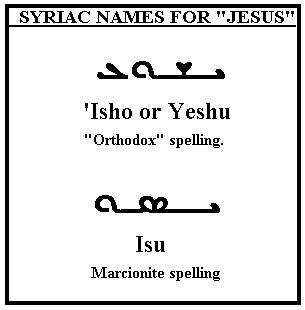Are you saying the Marcionites didn't love Jesus/Isu?A middle way of compromise would be:
the Jewish God is simply not loved by Marcion.

Are you saying the Marcionites didn't love Jesus/Isu?A middle way of compromise would be:
the Jewish God is simply not loved by Marcion.

Are you saying that the Marcionites only denied the Father was the Creator, that Jesus was the Father, that 'Christ' was the Father, that Christ = Jesus? Which is the proper denial here? Do you at least begin to see that there is a proposition being put forward by Tertullian:they had been in any error on the subject of God the Creator, or of his Christ. [Adv Marc 1.4]
sets up the reaction which follows:the Creator + his Christ
what they actually believed however isn't clear. It could be:i.e. that the Marcionites 'deny' that Christ was the subordinate of the Creator
The Latin is:that he directs to the one purpose of setting up opposition between the Old Testament and the New, and thereby putting his Christ in separation from the Creator, as belonging to another god (proinde Christum suum a creatore separatum, ut dei alterius), and having no connection with the law and the prophets. [Adv Marc 1.6]
Holmes translates it as:Certe enim totum quod elaboravit etiam Antitheses praestruendo in hoc cogit, ut veteris et novi testamenti diversitatem constituat,1 proinde Christum suum a creatore separatum, ut dei alterius, ut alienum legis et prophetarum
But I find it curious that "ut dei alterius" has nothing resembling 'belonging.' The sentence is more properly rendered:that he may establish a diversity between the Old and the New Testaments, so that his own Christ may be separate from the Creator, as belonging to this rival god, and as alien from the law and the prophets.
The point is that the argument is something to the effect that one god gave the new dispensation (Knox writes at length about the change in meaning from διαθήκη to testamentum) the other god gave the old. Who was the old god? The god at Sinai = Ishu. The voice in the heaven isn't seen by the Israelites. Moses is the 'man of God' because he takes on the form of Ishu = His (God's) Man.... so that (he is) another god
No, that's not a justified conclusion.Blood wrote:OK, this helps to clarify. The quote does not come from Democritus at all. It originates from Apion and is paraphrased by Josephus in Contra Apion:
Here are those references in Reinach.Peter Kirby wrote:
This is the reference (footnote 8):
Reinach, Nos. 60, 61, p. 121; Josephus, Against Apion, II, 8.





Google translate of Mueller's Latin:Democritus, historian. Books: Tactics in two books; Of the Jews in this book he said they worshiped a donkey head in gold, and every seven years they captured a foreigner, led him (in their temple) and sacrificed by cutting his flesh in small pieces.
PS -- this is not the famous philosopher Democritus. The Jewish Encyclopedia has this to say:Democritus, the historian, he wrote two books on tactics, and also of the Jews, in which the head of an ass, the golden works give them over to worship, offer sacrifices, and to kill, and in the seventh year, which was taken by a stranger, his flesh, finely grinded.
Others assign the historian Democritus to the 1st century BCE, which (if true) would mean that he wouldn't be dependent on Josephus.Similar in import is the following statement of a certain Democritus, which the Greek lexicographer Suidas (tenth century) has preserved: "Every seven years the Jews catch a stranger, whom they offer as a sacrifice, killing him by tearing his flesh into shreds" (0151τι κατὰ έπταετίαν ξένων άγρεόοντες προσέφερον καί κατὰ λεπτὰ τὰς σάρκας διέξαινον καί οὓτως ἀνῄρουν). Nothing further is known of Democritus. Perhaps he drew his information from Apion's book.
Yeah, that Democritus probably has nothing to do with it.Blood wrote:Now I'm really confused. The Democritus who wrote Maxims was the 5th Century Pre-Socratic atomist philosopher.
Yes, that's right.Blood wrote:I've got it now. I think.
The OP attributed the quote to Democritus, the pre-Socratic philosopher of the 5th Century, and his lost book Maxims.
This is incorrect. The quote is actually some later character also named Democritus, in a lost book called "On the Jews." We only know about this attribution because the 10th century Suda refers to it.
The same story of human sacrifice appears in Josephus, Contra Apion, Book Two, but that book makes no reference to either of the Democrituses. Josephus is apparently quoting Apion, who may be quoting Democritus "the historian," but if so, it isn't cited by Apion or Josephus.
So, to bring it back around to the OP, no "blood libel" was known to exist to pre-Socratic Greek philosophers. The "blood libel" legend can be definitively traced only to the First Century CE via Apion and Josephus, who may be drawing on a slightly earlier Greek writer named Democritus.